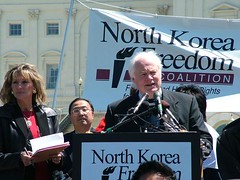House Staffer: Congress to Demand Progress on NKHRA Implementation
If historians were both omniscient and judicious, they would record that Doug Anderson was a great friend of the North Korean people. Anderson, a thin, quiet, and precise young lawyer and staffer for Rep. James Leach, never misses a House hearing on North Korea policy. He is also a key behind-the-scenes advocate of more humane treatment for the people North Korea (meaning I’m not sure he’d want this kind of recognition, warranted though it may be). I’ve never heard an ill word spoken of him. Now that I’ve introduced Doug, here is a comment he sent me by e-mail and left on The Korea Liberator today:
Based on continuing requests, I have assembled a one-stop shop for all of the official documents related to the North Korean Human Rights Act (P.L. 108-333). It includes links to the law itself, to the House hearings on the subject, to the Executive Branch reports filed pursuant to the Act, and to the legislative history of the Act. I’ll try to keep it relatively current, and have reason to believe that it will be updated in the next day or two to include a letter from some key Congressional Members encouraging the Administration to begin implementing Title III of the bill (relating to refugees). [emphasis mine]
 Here. Thanks, Doug. We’ll be watching that page carefully. It means, as predicted here before, that Congress’s patience with the State Department’s dithering on NKHRA implementation is about exhausted. Here is an excerpt of Rep. Leach’s statements at last October’s hearings:
Here. Thanks, Doug. We’ll be watching that page carefully. It means, as predicted here before, that Congress’s patience with the State Department’s dithering on NKHRA implementation is about exhausted. Here is an excerpt of Rep. Leach’s statements at last October’s hearings:
The response to our questions at that hearing indicated that the United States had not yet undertaken the high level diplomatic efforts with third countries necessary to allow us to proceed with the quiet process of saving even some limited number of intending refugees.
This was underscored last week when the Department of State reported to Congress, and I quote, ”that there were no applications for refugee admission to the United States filed by North Koreans during the past year.”
Well, this is a true statement, it is just not describing the underlying facts. We are aware of cases where North Korean refugees hiding in third countries have approached United States diplomatic posts, unsuccessfully seeking assistance for relocating to the U.S. as refugees.
Furthermore, the report demonstrates an adequate disregard for the requirements of current law. Section 303 of the act imposes an affirmative obligation on the Department of State to, and I quote, ”facilitate the submission of refugee applications” by North Koreans. Thus, an annual total of zero applications and zero admissions is clearly unacceptable.
After taking a dig at the administration for delaying the appointment of Special Envoy Jay Lefkowitz, Leach closed this way:
In closing, it must be understood that the Congress did not intend the North Korean Human Rights Act as a rhetorical exercise. The law was enacted to promote respect for human rights, transparency in the delivery of humanitarian aid, and protection for North Korean refugees. It granted considerable discretion to Executive Branch agencies in pursuing those ends.
In a government of laws, the Executive clearly has obligations it is yet to meet. This is disconcerting to say the least.
A reminder about Leach: he’s no neocon fanatic by any stretch. Leach, who is widely respected for his disciplined, even-tempered moderation, actually opposes talk of regime change (which, of course, is exactly what this site’s authors explicitly advocate).
So now we know why the State Department is suddenly promising to move forward on NKHRA implentation. In a town of few secrets, word had undoubtedly reached State that Congress was about to speak up. We’ve explained that much, but explain this: Why is the administration of a president who “loathes” Kim Jong Il being dragged into compliance with this law by its ear?